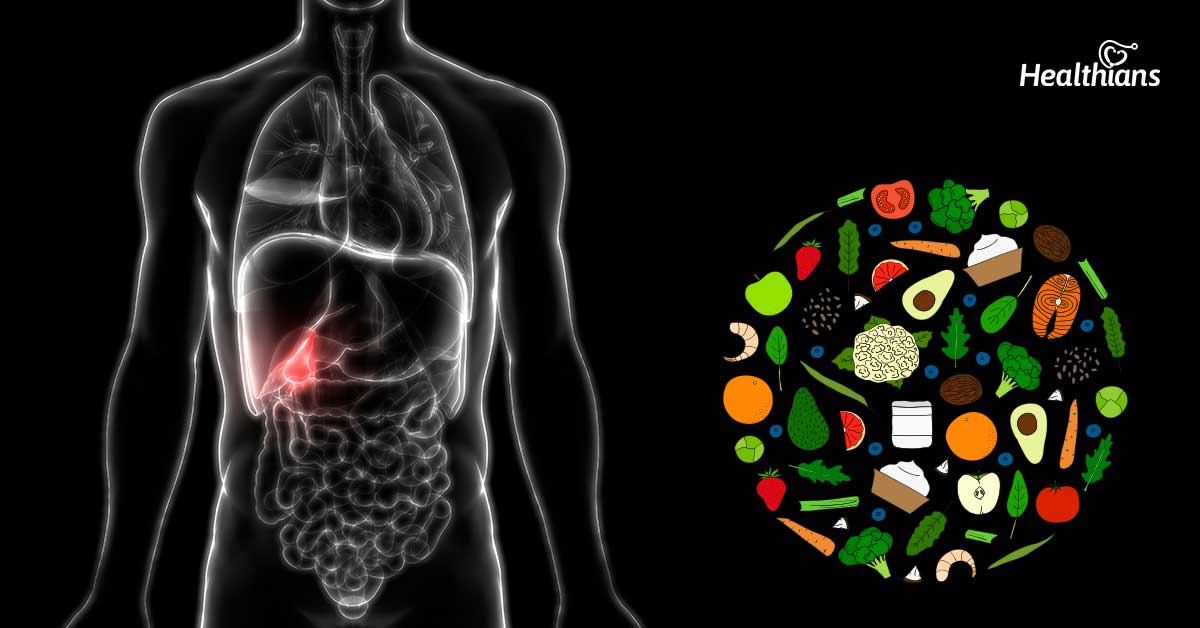Contributed by – Healthians Team
Gallbladder is a pear shaped small sac located on the underside of the liver which helps in digestion. Gallbladder stores bile and delivers it to small intestine which further aids in breaking down of the food. Gallstones although really common are hardly taken seriously until it starts creating trouble.
But the real question is – What exactly are gallstones?
Gallstones are pieces or lumps of solid material formed in the gallbladder and are of 2 types:
Cholesterol stones- Greenish yellow in colour these are made up of mainly undissolved cholesterol particles.
Pigment stones- Much darker in colour is caused due to high content of bilirubin in the bile.
Gallstones have no specific symptoms or are rather asymptomatic until the stones block the bile duct, which interferes with the movement of the bile to small intestine and further hampers the entire digestion process. Such blockage also leads to severe pain in the upper right side of the abdomen. The pain can extend to the back and shoulder blades as well. Sometimes the pain is accompanied with:
- Nausea
- Vomiting
- Dark coloured urine
- Fever
- Bloating and indigestion
It is always better to stay aware and protect ourselves from various health complications. The best preparation starts at home with small changes in everyday lifestyle. Food plays such a major role and it is always wiser to eat healthy. Any health problem can be dealt with effective dietary changes. It is really important to know what to eat and what not to eat so that we can choose wisely.
Do not wait for the symptoms to show, take some healthy advice and imbibe them and make them a part of your daily routine. Here are the dietary do’s and don’ts to follow if you are at the risk of forming gallstones, diagnosed with gallstones or have got operated for same.
Dietary Do’s For Gallstones
Food is absolutely necessary for survival. None of us can live without it. But it is important to differentiate between the healthy and unhealthy foods.
Some of the dietary advice for gallstones are:
- Have low fat diet to prevent hyper secretion of bile juice
- Also increase the intake of MUFA (monosaturated fats) rich foods as they help with gallbladder cleansing, so include flaxseeds, walnuts, olives and Olive oil in everyday diet
- Sources of soluble fibre foods like sprouts, fenugreek (methi) seeds help to get rid of bile acids sterols
- Vitamin C rich foods such as gooseberries, oranges, lemon, lime should be included as help in prevention of gall stones
- Several fibre rich vegetables and fruits like cauliflower, carrots, beans, broccoli, papaya, bananas, berries etc. are highly recommended
- Coffee can also have effect the secretion of cholecystokinin and prevent crystallization of cholesterol
- Total fat intake should not be more than 30 g to 45 g per day. Out of this up to 10 g should be from monosaturated rich foods
Dietary Don’ts For Gallstones
Several foods can be harmful for a particular health condition. Avoiding such foods is always a smart idea. It is good to take your health seriously and follow proper dietary measures.
The important dietary don’ts for gallstones are:
- Avoid fatty or fried foods as they increases the secretion of bile juice
- Control your non-veg intake such as chicken, fish or sea foods as they are rich in cholesterol and are capable of raising the blood cholesterol levels
- Try avoiding alcohol as it also triggers bile secretion. Regular and binge drinking is a complete no
- Oral contraceptives can cause gallstones as these steroid medications effect the cholesterol metabolism
- Too much gap between meals or skipping meals is not at all advised, as it effects liver function resulting in impaired bile secretion
- Do not go on crash diets or ketogenic diets as it triggers rapid fat metabolization which also triggers bile secretion as well as raise blood cholesterol level
Somebody diagnosed with gallstones or even after the getting operated should follow the above mentioned dietary suggestions strictly.
Some small changes in your diet will not only help you aid good health but can also help you avoid or fight diseases. The trick for healthy gallbladder is to avoid fatty and cholesterol rich food and opt for lighter, healthier and fibre rich foods.
Understand your gallbladder and eat accordingly.





Helpful information, thanks to Divya medam